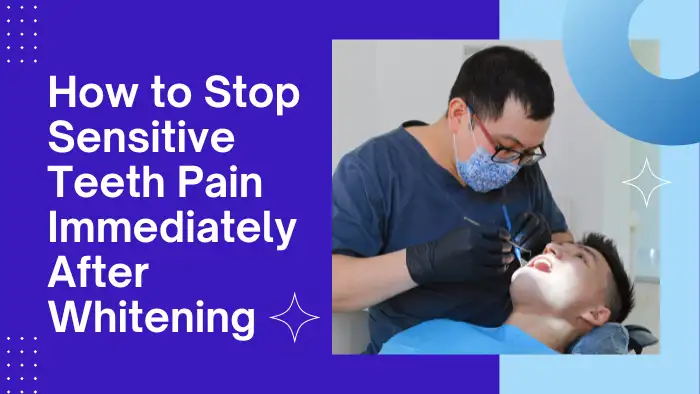A white smile can make you feel good and be memorable. But teeth whitening can hurt and make your teeth sensitive.
If this happens to you, don’t worry. There are ways to make it feel better.
If you’re experiencing sensitive teeth pain after whitening, here are some steps you can take to alleviate the discomfort:
- Rinse with lukewarm water: Rinse your mouth with lukewarm water to help soothe the sensitivity.
- Use a desensitizing toothpaste: Use a desensitizing toothpaste, which contains ingredients like potassium nitrate or strontium chloride, to reduce tooth sensitivity.
- Apply fluoride gel: You can also apply a fluoride gel to your teeth to help reduce sensitivity.
- Avoid hot and cold drinks: Avoid hot and cold drinks for a few hours after whitening, as they can exacerbate tooth sensitivity.
- Avoid acidic foods and drinks: Avoid acidic foods and drinks like citrus fruits, soda, and wine, as they can also worsen tooth sensitivity.
- Take pain medication: Over-the-counter pain medications like ibuprofen or acetaminophen can help alleviate tooth sensitivity.
Use Desensitizing Toothpaste
Desensitizing toothpaste can help with sensitive teeth. It has special ingredients that block pain signals and rebuild tooth enamel.
Use it like regular toothpaste, focusing on the sensitive areas.
Pros and Cons:
Pros
- Reduced Discomfort: Using methods to stop sensitive teeth pain after whitening can significantly reduce discomfort and pain, allowing you to enjoy your new, brighter smile.
- Quick Relief: Many of the remedies for sensitive teeth pain after whitening can provide immediate relief, making them a convenient and effective solution.
- Easy to Implement: Most of the methods for stopping sensitive teeth pain after whitening can be easily implemented at home, making them accessible and cost-effective.
Cons
- Temporary Relief: Many of the remedies for sensitive teeth pain after whitening provide only temporary relief and may need to be repeated over several days or weeks.
- Unpleasant Side Effects: Some of the methods, such as using desensitizing toothpaste, may have unpleasant side effects like a chalky taste or feeling.
- Not Effective for All: Some individuals may experience sensitivity or pain after whitening that cannot be effectively treated by these methods, requiring additional dental treatment.
- Cost: While many of the remedies for stopping sensitive teeth pain after whitening can be implemented at home, some desensitizing products may be more expensive than regular toothpaste. Additionally, dental treatments to alleviate sensitivity may also come at an additional cost.
Apply a Cold Compress
To ease sensitive teeth pain, use a cold compress on the sore spots. This will lessen swelling and numb the area, giving momentary comfort.
To do this, wrap some ice cubes in a clean cloth and hold it against your cheek for 10-15 minutes.

Rinse with Salt Water
Saltwater can help with sensitive teeth pain. It is a natural antiseptic that reduces inflammation and kills mouth bacteria.
To make the rinse, mix 1/2 teaspoon of salt with warm water, swish it in your mouth for 30 seconds, then spit it out.
Avoid Acidic Foods and Drinks
Avoid acidic foods and drinks if you have sensitive teeth pain after whitening. They can make your teeth hurt more.
Examples of acidic foods and drinks are citrus fruits, soda, and vinegar-based dressings.
Use a Soft-Bristled Toothbrush
To ease sensitive teeth pain, use a soft-bristled toothbrush. Hard-bristled toothbrushes can harm your teeth’s enamel and make sensitivity worse.
A soft-bristled toothbrush cleans teeth gently and doesn’t cause extra discomfort.
Best Painkiller For Sensitive Teeth After Whitening
After teeth whitening, if your teeth are sensitive, take ibuprofen. It reduces pain and inflammation.
Follow the instructions on the package or your dentist’s advice.

How Long Will My Teeth Hurt After Whitening
Whitening can cause tooth pain for varying amounts of time. The duration depends on the person and the type of treatment.
Sensitivity may only last a few hours for some, but a few days for others. In rare cases, it can last for weeks.
If you have severe or long-lasting sensitivity, talk to your dentist.
Discuss Sensitivity with Your Dentist before Whitening Your Teeth
Talk to your dentist before whitening your teeth. They can tell you if it’s a good idea and suggest the best treatment.
If your teeth are sensitive, they can suggest other treatments or ways to make it less sensitive during and after whitening.
Avoid Extremely Hot and Cold Foods & Drinks during Your Treatment
Avoid hot or cold foods and drinks during and after teeth whitening. They can cause discomfort and increase sensitivity.
Eat and drink lukewarm or room-temperature items instead. Stay away from acidic foods and drinks like citrus fruits and juices, as they can irritate sensitive teeth.

Keep Brushing Your Teeth Consistently & Consider Anti-Sensitivity Toothpaste
Brush your teeth twice a day with a soft-bristled toothbrush and fluoride toothpaste to keep your teeth healthy and reduce sensitivity.
You can also try using anti-sensitivity toothpaste to help desensitize your teeth. Be gentle when brushing to avoid irritating your sensitive teeth.
Conclusion
Teeth whitening can make your teeth hurt. But you can do things to feel better.
Use special toothpaste, put something cold on your teeth, rinse with salt water, don’t eat or drink acidic things, and use a soft toothbrush.
These things will help you feel better fast. If you are still hurt after trying these things, talk to your dentist to make sure nothing else is wrong.
Frequently Asked Questions
Why do my teeth feel sensitive after whitening?
Teeth whitening treatments can cause temporary sensitivity because the bleach used to whiten your teeth can penetrate the enamel and reach the nerves inside your teeth, causing discomfort.
How long will the sensitivity last?
The sensitivity usually lasts for a few days to a week after whitening, but this varies depending on the individual and the whitening method used.
Can I use regular toothpaste after whitening?
Yes, you can use regular toothpaste after whitening, but using a desensitizing toothpaste may be more effective at reducing sensitivity.
Can I eat and drink normally after whitening?
It is best to avoid acidic foods and drinks after whitening, as they can worsen sensitivity. You may also want to avoid hot or cold foods and drinks for a few days after treatment.
Can I take pain medication for sensitive teeth after whitening?
You can take over-the-counter pain medication like ibuprofen to help alleviate sensitivity and discomfort after whitening.
Can I whiten my teeth if I have sensitive teeth?
If you have sensitive teeth, it is important to consult with your dentist before undergoing any teeth whitening treatments. They may recommend alternative methods or prescribe desensitizing products.
How can I prevent sensitivity before whitening?
Using a desensitizing toothpaste for a few weeks before whitening can help to prevent sensitivity. Additionally, spacing out your whitening sessions and using a lower concentration of bleach can also help.
Can sensitivity after whitening be permanent?
In rare cases, sensitivity after whitening can become permanent. This usually happens if the enamel is worn down or if there is an underlying dental issue.
How long should I wait to brush my teeth after whitening?
It is recommended to wait at least 30 minutes to brush your teeth after whitening, as the enamel is more porous and susceptible to damage immediately after treatment.
What should I do if the sensitivity persists after whitening?
If your sensitivity persists after trying these remedies, it is important to consult with your dentist to ensure there are no underlying issues causing the discomfort. They may recommend additional treatment or products to alleviate the sensitivity.

A Blogger, Author and Researcher! Gohar Aalam is recognized as a full-time blogger for Health and Tech Niches. I’m a Fountainhead of Gethealthup.com, will provides high quality knowledge.









2 thoughts on “How to Stop Sensitive Teeth Pain Immediately After Whitening”